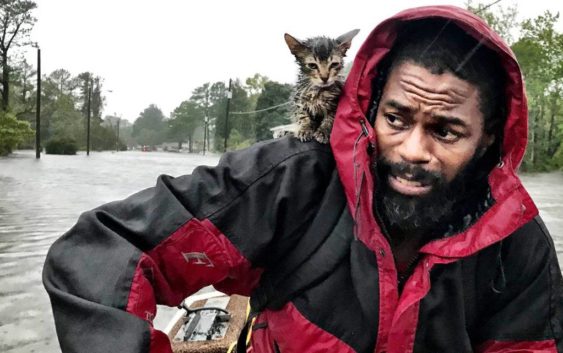- David & Nicole Tepper increase Hurricane Helene relief commitment to $750k
- David & Nicole Tepper increase Hurricane Helene relief commitment to $750k
- McDowell County wildfire spreads to 500 acres, evacuation orders in place
- Evacuations in Caldwell County due to wildfire
- Northwest Houston 'ghost neighborhood' caused by repeated flooding to become latest detention basin
Florence shows why people trust local news

Amid early Florence relief efforts, Gov. Roy Cooper tweeted, “Local news is more vital than ever,” and he was right: Our state benefited from a tremendous local news effort over the past two weeks. The question now becomes: What news and information do we need moving forward and how can we support the service we’ll depend on?
News people lived through Florence with their neighbors and did their jobs tirelessly, as did emergency responders, government agencies, aid organizations and others who serve the public. These same journalists now are immersed in helping North Carolinians find help or ways to help, cataloging destruction and loss and covering communities trying to pick life back up.
We’ll need reliable news and information as dozens of communities and hundreds of thousands of people deal with the micro-local (a key road or bridge) and the far-reaching (making sure aid money reaches those who need it; taking on big questions of rebuilding and climate change).
How can we hold onto the sense of common cause evident during Florence, to support the labor-intensive work that North Carolina’s newsrooms must take on next? We all have a part in the answers:
▪ News organizations need your financial support, and your ideas: Subscribe, donate, join as a member, become a corporate sponsor or contribute what you know. Don’t just send money: Let these outlets know what you expect and want from them; news organizations asking for funding should make sure their lines are open.
▪ Consumers need information that meets our needs, not just traditional news models. Around the country and in North Carolina, news organizations are finding new ways to engage communities, join up in collaborations and use in-person and digital platforms to do journalism in new ways. Our state’s news ecosystem has homegrown innovators, national leaders and strong journalism schools as labs; local news experimentation is flourishing nationally and offers good models.
▪ Communities need information that is accessible to everyone and that advances public knowledge and participation. Out of the gate, post-Florence news efforts can aim to reach out to North Carolinians who’ll be affected, not just as receivers of information but as stakeholders whose voices should be heard and amplified. Community partnerships and philanthropy can support this kind of public engagement.
Amid Florence we saw why people tend to trust local news, as a Poynter study confirmed recently. Wading through floodwaters, posting updates at all hours, shedding tears with people who’d lost everything, staying on the job and on the air after being flooded out — North Carolina’s journalists did their jobs diligently and with a lot of heart. Along with facts, they offered empathy and local knowledge.
After this extended crisis, North Carolinians understand the value of trustworthy, accurate, timely news and information. Yet for these news outlets, there is no FEMA or National Guard; no infusion of federal dollars to support the work at hand in keeping information flowing for local communities now that national attention has largely moved elsewhere.
The best decisions for North Carolina’s future rest on people having access to high-quality, independent reporting. Local news is part of the infrastructure for a successful storm recovery: Let’s ask for what we need next from our news providers, and support it in every way we can.